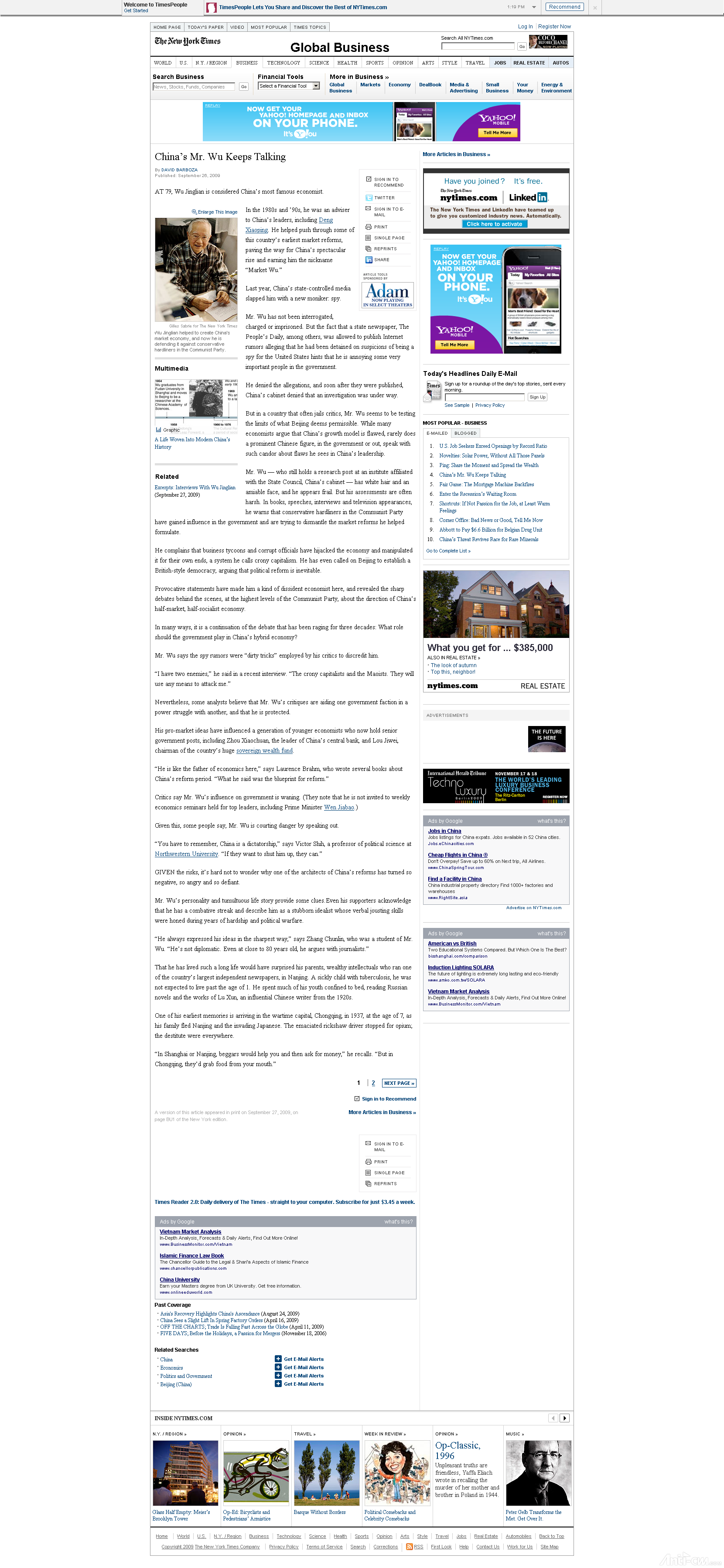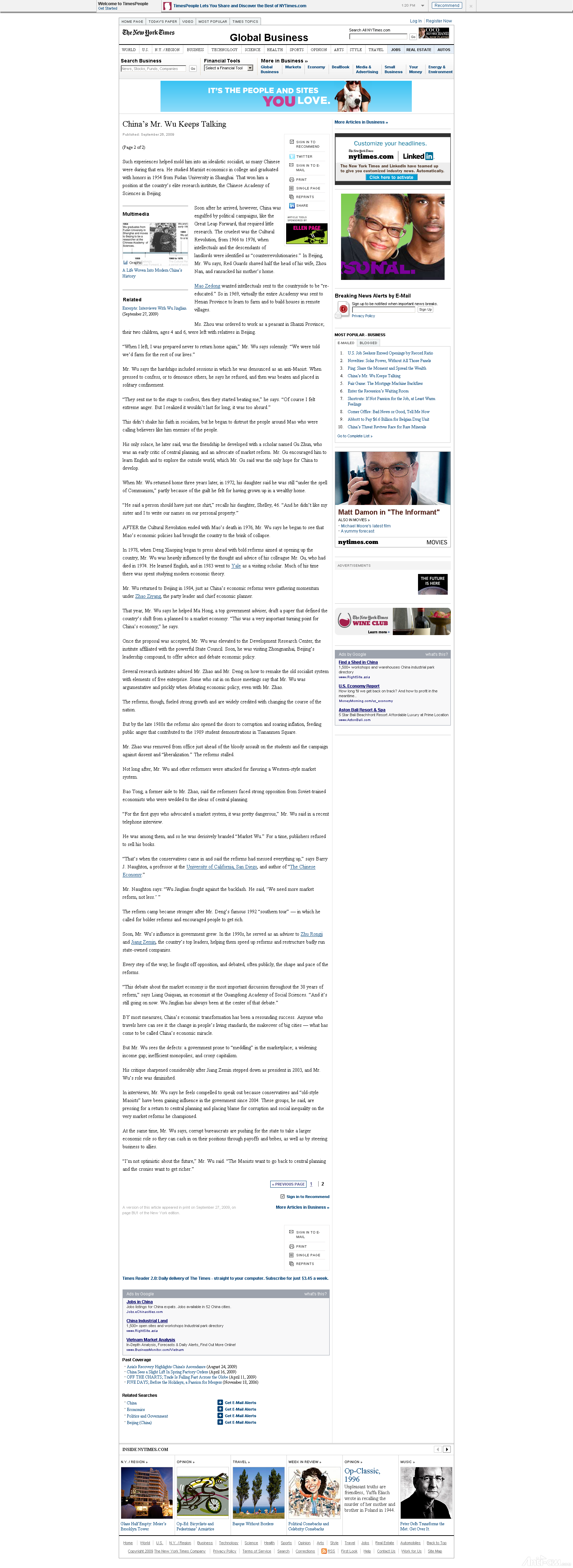|
|
China’s Mr. Wu Keeps Talking
http://www.nytimes.com/2009/09/27/business/global/27spy.html?pagewanted=1&_r=1
By DAVID BARBOZA
Published: September 26, 2009
AT 79, Wu Jinglian is considered China’s most famous economist.

Wu Jinglian helped to create China's market economy, and now he isdefending it against conservative hardliners in the Communist Party.
In the 1980s and ’90s, he was an adviser to China’s leaders, including Deng Xiaoping.He helped push through some of this country’s earliest market reforms,paving the way for China’s spectacular rise and earning him thenickname “Market Wu.”
Last year, China’s state-controlled media slapped him with a new moniker: spy.
Mr.Wu has not been interrogated, charged or imprisoned. But the fact thata state newspaper, The People’s Daily, among others, was allowed topublish Internet rumors alleging that he had been detained onsuspicions of being a spy for the United States hints that he isannoying some very important people in the government.
He denied the allegations, and soon after they were published, China’s cabinet denied that an investigation was under way.
Butin a country that often jails critics, Mr. Wu seems to be testing thelimits of what Beijing deems permissible. While many economists arguethat China’s growth model is flawed, rarely does a prominent Chinesefigure, in the government or out, speak with such candor about flaws hesees in China’s leadership.
Mr. Wu — who still holds a researchpost at an institute affiliated with the State Council, China’s cabinet— has white hair and an amiable face, and he appears frail. But hisassessments are often harsh. In books, speeches, interviews andtelevision appearances, he warns that conservative hardliners in theCommunist Party have gained influence in the government and are tryingto dismantle the market reforms he helped formulate.
Hecomplains that business tycoons and corrupt officials have hijacked theeconomy and manipulated it for their own ends, a system he calls cronycapitalism. He has even called on Beijing to establish a British-styledemocracy, arguing that political reform is inevitable.
Provocativestatements have made him a kind of dissident economist here, andrevealed the sharp debates behind the scenes, at the highest levels ofthe Communist Party, about the direction of China’s half-market,half-socialist economy.
In many ways, it is a continuation ofthe debate that has been raging for three decades: What role should thegovernment play in China’s hybrid economy?
Mr. Wu says the spy rumors were “dirty tricks” employed by his critics to discredit him.
“I have two enemies,” he said in a recent interview. “The cronycapitalists and the Maoists. They will use any means to attack me.”
Nevertheless, some analysts believe that Mr. Wu’s critiques are aidingone government faction in a power struggle with another, and that he isprotected.
His pro-market ideas have influenced a generation ofyounger economists who now hold senior government posts, including ZhouXiaochuan, the leader of China’s central bank, and Lou Jiwei, chairmanof the country’s huge sovereign wealth fund.
“Heis like the father of economics here,” says Laurence Brahm, who wroteseveral books about China’s reform period. “What he said was theblueprint for reform.”
Critics say Mr. Wu’s influence ongovernment is waning. (They note that he is not invited to weeklyeconomics seminars held for top leaders, including Prime Minister Wen Jiabao.)
Given this, some people say, Mr. Wu is courting danger by speaking out.
“You have to remember, China is a dictatorship,” says Victor Shih, a professor of political science at Northwestern University. “If they want to shut him up, they can.”
GIVENthe risks, it’s hard not to wonder why one of the architects of China’sreforms has turned so negative, so angry and so defiant.
Mr. Wu’spersonality and tumultuous life story provide some clues.Even hissupporters acknowledge that he has a combative streak and describe himas a stubborn idealist whose verbal jousting skills were honed duringyears of hardship and political warfare.
“He always expressedhis ideas in the sharpest way,” says Zhang Chunlin, who was a studentof Mr. Wu. “He’s not diplomatic. Even at close to 80 years old, heargues with journalists.”
That he has lived such a long lifewould have surprised his parents, wealthy intellectuals who ran one ofthe country’s largest independent newspapers, in Nanjing. A sicklychild with tuberculosis, he was not expected to live past the age of 1.He spent much of his youth confined to bed, reading Russian novels andthe works of Lu Xun, an influential Chinese writer from the 1920s.
Oneof his earliest memories is arriving in the wartime capital, Chongqing,in 1937, at the age of 7, as his family fled Nanjing and the invadingJapanese. The emaciated rickshaw driver stopped for opium; thedestitute were everywhere.
“In Shanghai or Nanjing, beggarswould help you and then ask for money,” he recalls. “But in Chongqing,they’d grab food from your mouth.”
Such experiences helped mold him into an idealistic socialist, as manyChinese were during that era. He studied Marxist economics in collegeand graduated with honors in 1954 from Fudan University in Shanghai.That won him a position at the country’s elite research institute, theChinese Academy of Sciences in Beijing.
Soon after he arrived, however, China was engulfed by political campaigns, like the Great Leap Forward, that required little research. The cruelest was the Cultural Revolution,from 1966 to 1976, when intellectuals and the descendants of landlordswere identified as “counterrevolutionaries.” In Beijing, Mr. Wu says,Red Guards shaved half the head of his wife, Zhou Nan, and ransackedhis mother’s home.
Mao Zedong wanted intellectualssent to the countryside to be “re-educated.” So in 1969, virtually theentire Academy was sent to Henan Province to learn to farm and to buildhouses in remote villages.
Ms. Zhou was ordered to work as apeasant in Shanxi Province; their two children, ages 4 and 6, were leftwith relatives in Beijing.
“When I left, I was prepared never toreturn home again,” Mr. Wu says solemnly. “We were told we’d farm forthe rest of our lives.”
Mr. Wu says the hardships includedsessions in which he was denounced as an anti-Maoist. When pressed toconfess, or to denounce others, he says he refused, and then was beatenand placed in solitary confinement.
“They sent me to the stageto confess, then they started beating me,” he says. “Of course I feltextreme anger. But I realized it wouldn’t last for long; it was tooabsurd.”
This didn’t shake his faith in socialism, but he beganto distrust the people around Mao who were calling believers like himenemies of the people.
His only solace, he later said, was thefriendship he developed with a scholar named Gu Zhun, who was an earlycritic of central planning, and an advocate of market reform. Mr. Guencouraged him to learn English and to explore the outside world, whichMr. Gu said was the only hope for China to develop.
When Mr. Wureturned home three years later, in 1972, his daughter said he wasstill “under the spell of Communism,” partly because of the guilt hefelt for having grown up in a wealthy home.
“He said a personshould have just one shirt,” recalls his daughter, Shelley, 46. “And hedidn’t like my sister and I to write our names on our personalproperty.”
AFTER the Cultural Revolution ended with Mao’s deathin 1976, Mr. Wu says he began to see that Mao’s economic policies hadbrought the country to the brink of collapse.
In 1978, whenDeng Xiaoping began to press ahead with bold reforms aimed at openingup the country, Mr. Wu was heavily influenced by the thought and adviceof his colleague Mr. Gu, who had died in 1974. He learned English, andin 1983 went to Yale as a visiting scholar. Much of his time there was spent studying modern economic theory.
Mr. Wu returned to Beijing in 1984, just as China’s economic reforms were gathering momentum under Zhao Ziyang, the party leader and chief economic planner.
That year, Mr. Wu says he helped Ma Hong, a top government adviser,draft a paper that defined the country’s shift from a planned to amarket economy. “This was a very important turning point for China’seconomy,” he says.
Once the proposal was accepted, Mr. Wu waselevated to the Development Research Center, the institute affiliatedwith the powerful State Council. Soon, he was visiting Zhongnanhai,Beijing’s leadership compound, to offer advice and debate economicpolicy.
Several research institutes advised Mr. Zhao and Mr.Deng on how to remake the old socialist system with elements of freeenterprise. Some who sat in on those meetings say that Mr. Wu wasargumentative and prickly when debating economic policy, even with Mr.Zhao.
The reforms, though, fueled strong growth and are widely credited with changing the course of the nation.
Butby the late 1980s the reforms also opened the doors to corruption andsoaring inflation, feeding public anger that contributed to the 1989student demonstrations in Tiananmen Square.
Mr. Zhao was removedfrom office just ahead of the bloody assault on the students and thecampaign against dissent and “liberalization.” The reforms stalled.
Not long after, Mr. Wu and other reformers were attacked for favoring a Western-style market system.
Bao Tong, a former aide to Mr. Zhao, said the reformers faced strongopposition from Soviet-trained economists who were wedded to the ideasof central planning.
“For the first guys who advocated a market system, it was pretty dangerous,” Mr. Wu said in a recent telephone interview.
He was among them, and so he was derisively branded “Market Wu.” For a time, publishers refused to sell his books.
“That’s when the conservatives came in and said the reforms had messedeverything up,” says Barry J. Naughton, a professor at the University of California, San Diego, and author of “The Chinese Economy.”
Mr. Naughton says: “Wu Jinglian fought against the backlash. He said, ‘We need more market reform, not less.’ ”
Thereform camp became stronger after Mr. Deng’s famous 1992 “southerntour” — in which he called for bolder reforms and encouraged people toget rich.
Soon, Mr. Wu’s influence in government grew. In the 1990s, he served as an adviser to Zhu Rongji and Jiang Zemin, the country’s top leaders, helping them speed up reforms and restructure badly run state-owned companies.
Every step of the way, he fought off opposition, and debated, often publicly, the shape and pace of the reforms.
“Thisdebate about the market economy is the most important discussionthroughout the 30 years of reform,” says Liang Guiquan, an economist atthe Guangdong Academy of Social Sciences. “And it’s still going on now.Wu Jinglian has always been at the center of that debate.”
BYmost measures, China’s economic transformation has been a resoundingsuccess. Anyone who travels here can see it: the change in people’sliving standards, the makeover of big cities — what has come to becalled China’s economic miracle.
But Mr. Wu sees the defects: agovernment prone to “meddling” in the marketplace; a widening incomegap; inefficient monopolies; and crony capitalism.
His critique sharpened considerably after Jiang Zemin stepped down as president in 2003, and Mr. Wu’s role was diminished.
Ininterviews, Mr. Wu says he feels compelled to speak out becauseconservatives and “old-style Maoists” have been gaining influence inthe government since 2004. These groups, he said, are pressing for areturn to central planning and placing blame for corruption and socialinequality on the very market reforms he championed.
At thesame time, Mr. Wu says, corrupt bureaucrats are pushing for the stateto take a larger economic role so they can cash in on their positionsthrough payoffs and bribes, as well as by steering business to allies.
“I’m not optimistic about the future,” Mr. Wu said. “The Maoists wantto go back to central planning and the cronies want to get richer.”


|
评分
-
1
查看全部评分
-
|